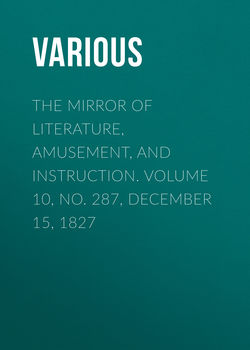The Mirror of Literature, Amusement, and Instruction. Volume 10, No. 287, December 15, 1827

Реклама. ООО «ЛитРес», ИНН: 7719571260.
Отрывок из книги
London, in early times (King Ethelred's reign) consisted only of scattered buildings from Ludgate to Westminster, and none where the heart of the city now is; it was afterwards extended more westward and continued increasing–eastward being neglected until a more later period. Who can view its present well constructed houses, its numerous elegant squares and terraces, and its general superior appearance, without almost doubting that the inhabitants of Britain once dwelt in the most miserable habitations, regardless in every respect of comfort and cleanliness. Indeed, at an early period we seem to have been in a very wretched condition. Without carrying ourselves too far back, we will look at the state of the English about the year 1520, (Henry the Eighth's reign.) The houses were built entirely regardless of all that health and comfort could suggest. The situation of the doors and windows was never thought of, and the former only opened. The floors were made either of clay, or sand, covered with rushes, which were very seldom removed.1 Some few houses were built of stone, but generally they were composed of wood, coated over with mud, or cement, with straw or reed roofs. Things seem to have been in no very enviable condition during this reign. The laws were little obeyed; thefts and robbery were frequent, for "22,000 criminals are said to have been executed by the rigid justice of Henry VIII."
It is not surprising that crime should have been great in this reign, for Henry himself was not only guilty of many crimes, but patronised vice in the regular system of bull and bear-baiting, particularly on Sundays, about four in the afternoon, which exhibitions were attended by great crowds of persons of all classes. The accommodations of a royal establishment at this period are thus described:—"The apartments at Hampton Court had been furnished on a particular occasion, each with a candlestick, a basin, goblet and ewer of silver; yet the furniture of Henry's chamber, independent of the bed and cupboard, consisted only of a joint-stool, a pair of andirons, and a small mirror. The halls and chambers of the wealthy were replenished with a cupboard, long tables, or rather loose boards placed upon tressels, forms, a chair, and a few joint-stools. Carpets were only employed to garnish cupboards." The food in this reign appears to be in character with everything else. From a household book of the Earl of Northumberland, it appears that his family, during the winter, fed mostly on salt meat and salt fish, with "an appointment of 160 gallons of mustard." On flesh days through the year, breakfast for my lord and lady was a loaf of bread, two manchets, a quart of beer, a quart of wine, half a chine of mutton, or a chine of beef, boiled. The earl had only two cooks to dress victuals for more than two hundred people. Hens, chickens, and partridges, were reckoned delicacies, and were forbidden except at my lord's table.
.....
This excessive love for eating was not, however, confined to Henry's time, for about two centuries previous to this, (Edward III.) feasting was endeavoured to be restrained by a law, though Edward himself did not follow his own law, for when his "son, Lionel, of Clarence, married Violentes, of Milant there were thirty courses, and the fragments fed 1,500 persons."
The formation of London was but tardy and very irregular until the reign of Henry VIII. at which time, some extensive buildings and improvements were made. On the other hand, building seems at length to have gone on too rapidly, and caused such alarm, that about a century after Henry's reign, a proclamation was issued by James I. after mature deliberation, forbidding all new buildings within ten miles of London; and commanding if any were built after this they should be pulled down, though no notice was taken of them for seven years.
.....